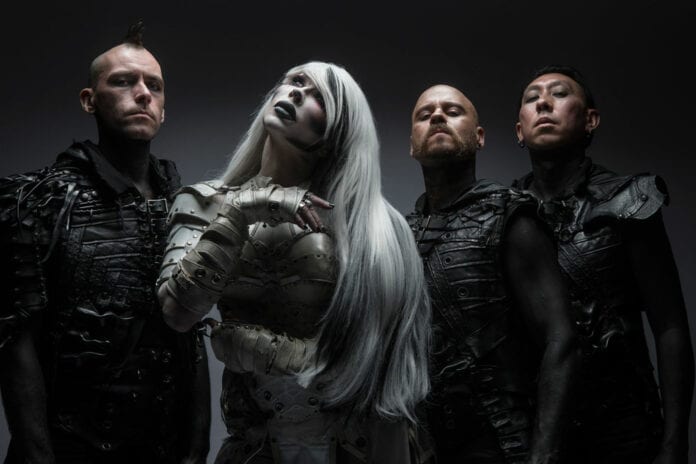
INTERVIEW WITH EMILY LAZAR & RICH JUZWICK BY JEREMY SAFFER
PHOTOGRAPHS BY JEREMY SAFFER
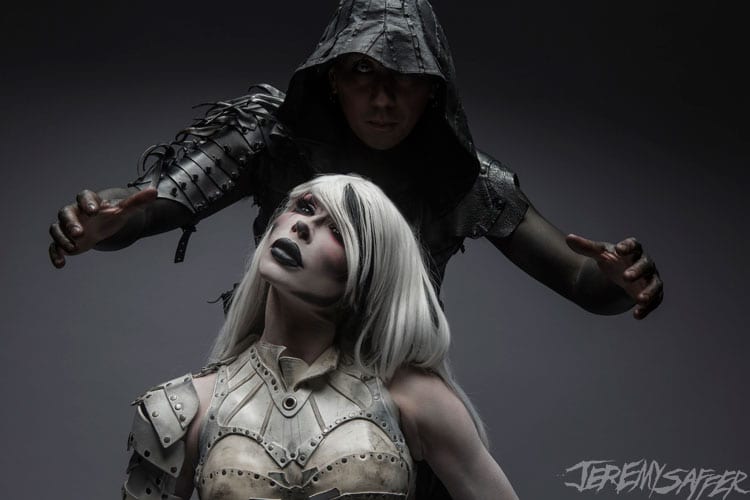
September Mourning has been busy touring and working on a follow-up to Volume II and the September Mourning comic book. With fate on the heels of Emily Lazar, both literally and figuratively, we find out from the enigmatic Lazar and guitarist Rich Juzwick what the band has been up to and what’s next for the Reapers, as they move forward onto the next chapter of September Mourning.
Volume II has been out for over two years. What’s been happening in the world of September Mourning since then?
Emily Lazar: We did a lot of touring on Volume II with Sumerian Records. We also put out three comic books in the span of two years—A Murder of Reapers, The Hand of Fate, and Trinity. They describe the story that coincided with the album and all the songs on there. And we’ve been writing new music, which is going to be coming out very soon, probably by the end of the year.
Rich Juzwick: We’ve been planetary alignment changing and refocusing and figuring out how we want the future of September Mourning and the musical story to evolve. That’s the most recent of what we’ve been doing.
Lazar: Yeah, on the musical side, our journey is taking us into different parts of our sound ecosystem, if you will, and shown us that we can dabble in hip-hop, pop, and rock and combine it all together because we have a very unique look. The comic book storyline is very unique, and how we put it all together as a transmedia project is very unique, so we wanted the sound to reflect that uniqueness and individuality. That’s what we’re trying to establish going forward into this next album.
The band seems to be touring more now than ever before. Are you going to be on the road for the majority of this year?
Juzwick: We intend to, but it comes down to the recording schedule. We are finishing this tour and then we have some dates in June scheduled, and there are tentative plans for the fall, but it all hinges on finishing the recording process. We’re about 60 to 70 percent of the way through. We have a lot of the tracks written. There’s probably a handful more that we want to write, and then we need to do the final comb through with the right producer to finish off the recording process.
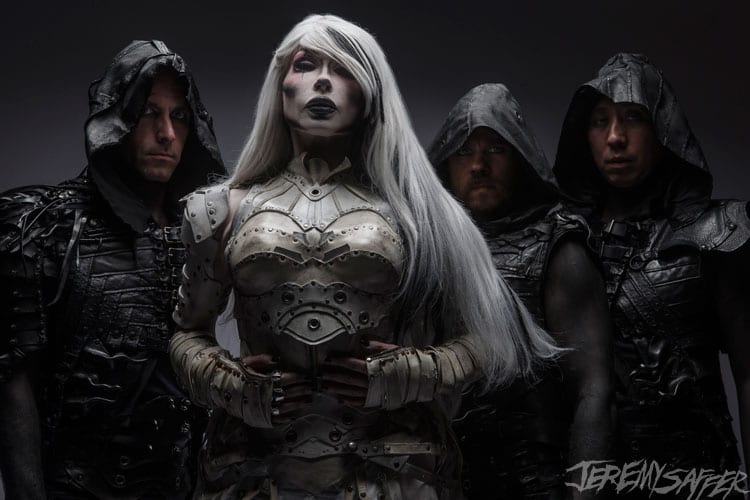
September Mourning used to be an East Coast band. What did the move to the West Coast do for the band?
Lazar: We started in New York, and I started off the concept by reaching out to Marc Silvestri and getting the storyline going. I threw the band together to try and formulate it a little more around the story, and I think that when we got to the point where it really needed to be fully developed and manifested, I realized that I needed to go to the West Coast to do that, from costume design to theatricality to graphic design to the comic books with Marc, Top Cow, and Image being on the West Coast.
Juzwick: Band personnel.
Lazar: Band personnel that we really needed to formulate the personalities of the band itself. I had to go to the West Coast to really make it congeal, so that’s what I decided to do—just pick up and really make a go at it. And that’s what we’ve been doing since then.
Juzwick: But now we are a no coast band.
Lazar: (laughs) Well, now that I’ve gotten the members, the members come from all over the place, so it moved from being this LA based thing to having members from Pennsylvania, Ohio, and also California.

“IT WAS ALWAYS DEVELOPED AS A TRANSMEDIA PROJECT, WHICH MAKES US VERY UNIQUE IN THE LANDSCAPE OF METAL AND ROCK RIGHT NOW”
What came first, the concept, the comic book, or the band?
Lazar: The concept came first, the comic book storyline, the characters, everything like that came first. It was always developed as a transmedia project, which makes us very unique in the landscape of metal and rock right now, because a lot of those bands that end up doing comic books do it after the fact or after they’ve been established then they try doing comic books. With us, the comic book came first. Marc Silvestri is somebody that’s really legitimate in comics to be standing there right with us, and that was a very main point for this whole project. So, I think that makes it very unique.
Are there any differences in the storyline between the comic books and the albums? Do fans need to get both to understand the whole story?
Lazar: I developed it in a certain way that the songs are stand-alone, because September’s character, she’s this human reaper hybrid. Her soul was taken, well, it was trying to be taken by a reaper named Riven, but he fell in love with her and wanted to save her, so he gave her his powers and she becomes this human reaper hybrid and goes around trying to give people second chances at life. Because of this storyline, when she takes a soul, she gets all of their emotional core and everything they’ve been through in their life absorbed into her. So, that gave me a way to write where it’s really open-ended. I can pretty much write about anything, because it could be about what somebody experienced in any sort of realm. In doing so, it means that the songs themselves can be about anything, because she’s this reaper. So, if you want to just listen to the music, you can do that. If you want to listen to the music alongside the comic books, it does relate to the comic books and you will find that out when reading it. But we tried to do everything so everything can be standalone, or if you want to be a total fan geek and really delve into the comics and really delve into the fandom of it all, you can totally do that. I totally support that 100 percent.
Juzwick: The way I see it is the music is a diary of the main character. It gives an extra dimension and layer to her personality. It’s not literally chronicling a band, like Coheed and Cambria where the lyrics are telling the story like musical theater. With this, you can read the comic book and you get it. You just listen to the music, it’s good songs, good lyrics, and a good message. You put them together, it doesn’t necessarily lock in that way, it’s just another layer.
Lazar: It gives emotional color to the story and the characters so that you really know “Children of Fate” is about all of these souls she’s accumulated and how she wants to set them free and give them these chances, and that’s what the song is about. It can also be about the fans themselves and their souls and how they pertain to our storyline and how they become a part of the show and become a part of what we do.
Juzwick: It’s a smart balance between being open-ended but very specific at the same time.
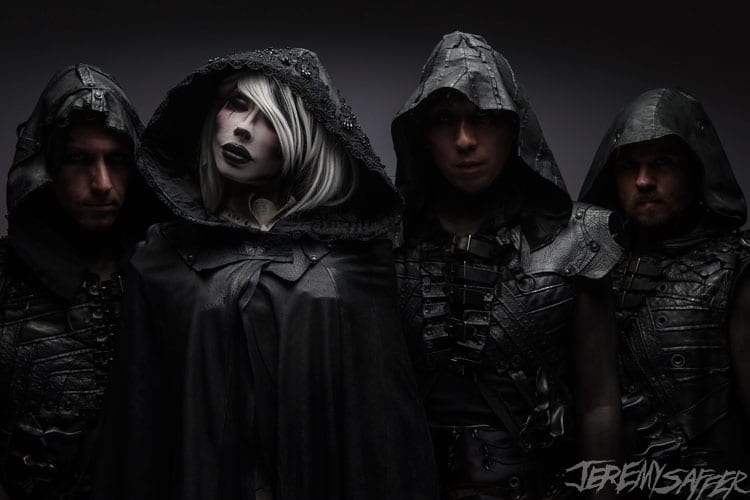
How do you go about developing the story, the comic book, and moving forward with the next album at the same time?
Lazar: Okay, so the fourth book is out with the graphic novel. It is in Barnes & Noble, Target, and your local comic book store. It will be pretty much everywhere, so you can pick that up. That’s the four issue story arc, which is the graphic novel. Now the second arc, I’ve already figured out what I want to do with it. I’ve already pre-written the second arc, so I just need to go in and actually write the books. It’s with her and what she does and how the story is formulated and the new characters that have been introduced. There’s such a way you could tell this forever. There’s just so many storylines and offshoots that go along with it, that it’s exciting because you can make her go in different directions. She can go totally dark for one story arc. She can go and do so many different things. It’s exciting.
How did you decide which member of the band was going to embody each character?
Lazar: Well, with Riven, who is sitting next to me right now…
Juzwick: My human name starts with an “R,” so it just makes sense (laughs).
Lazar: I looked at the personalities of the people that we were getting involved, and they replicate the personalities of the reapers a little bit in different ways. I think that really helped us find out which character was going to go to which person.
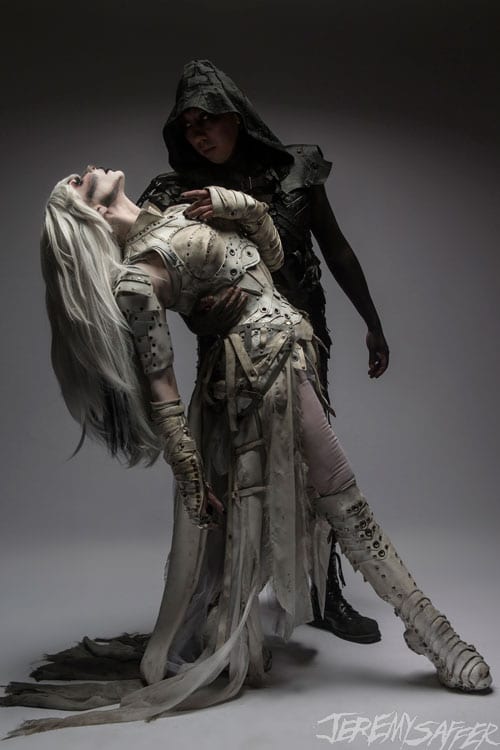
How do you embody September when you get on stage? What do you do to become September?
Lazar: The three hours of makeup that I have to do every night is pretty much how I embody her. It’s the reason why I love doing the makeup, and people are like, “Oh my god, three hours of prep work for every show!” But you have to understand that if you do musical theater or if you do theater in general…
Juzwick: Even if you watch a movie or a TV show, you realize the amount of makeup time that every person had to go through for that movie for the amount of days of shooting.
Lazar: Yeah, look at X-Men. They go into their trailers, and they do all their makeup. And by doing that, by putting on the face, it’s a transformative thing for me. It’s a ritual, and I do it every night and I get into a mood. I listen to certain music, and I like to wrap my head around it, so when I’m ready for the stage, I’m there, I’m present in that moment as that character. It’s very much like doing real theater. I come from a theater background and from a ballet background, so for me it makes a lot of sense to do it like this. It’s just how I grew up.
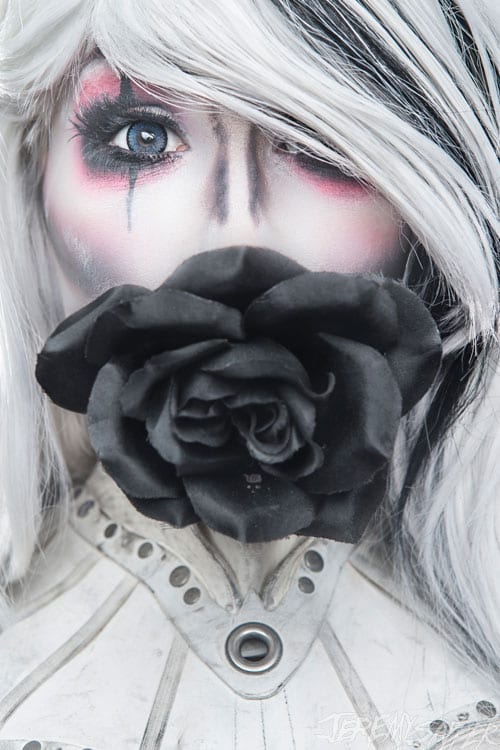
“WE CAN DO ALL THESE DIFFERENT THINGS AND HAVE ALL THESE DIFFERENT WEIRD COLORS GOING ON AT THE SAME TIME AND REALLY JUST A CRAZY ONSLAUGHT FOR YOUR SENSES”
Could you ever envision your live show becoming more of a storyline based performance, more theatrical rather than concert-driven?
Lazar: I’ve always wanted it to go that way. I’ve always wanted it to go even more into storytelling.
Juzwick: It will always be a mix of both, but if the ratio is 50/50 verses 60/40, we’d definitely want to get less bandy and more theater-ish.
Lazar: Yeah, I’d like to actually tell the story on stage and be almost like musical theater, but not as cheesy, not singing everything.
Juzwick: Using new mediums and new technologies to help tell the story. So, it’s not literally like theater, where you have set design, like Fiddler on the Roof.
Lazar: I want to do a new version of theater with it and have it be its own standalone show. I think there’s a way to do that, and I have various ideas on how to do that. We’re starting to use animated comics in the background. We had a minor mishap on this tour. Our computer that has all of our video broke down. We had to get it repaired, so we couldn’t do that the last week, but going forward we will be using that to facilitate telling the story. We do that on stage, and a lot of people have very much gravitated towards that. They’ve really liked that. They really think it’s cool. It sets the mood and you get the characters and how they are animated, and then you get these live characters. It’s almost like they jump off the page, and I think that’s a really cool thing. We’ve been doing that for a little while now.
Juzwick: I just realized when you watch our show, it’s like when you watch a cartoon and there are commercials in between. I don’t know which one to call which, but we have a song, then we have the commercial of the comic in between or the other way around we have the story going on.
Lazar: I don’t know if it would be actually described as commercials, because it’s actually thought over.
Juzwick: No, no, but I’m saying you have the continuous story, whether the music’s the story or the story’s the story, then there’s something that breaks it up and sets up and makes you understand what’s about to happen next.
Lazar: For me, it’s just about tonality and having different tones on stage. When I grew up in theater, I liked having a palette of a lot of different colors when I looked at a show. I wanted to see a lot of different things, and I don’t mean colors like literal colors. I mean, colors as in singing, dancing, this and that, like other things going on, and so when I started September Mourning, that’s the ideal place that it’s getting to, that spot where we can do all these different things and have all these different weird colors going on at the same time and really just a crazy onslaught for your senses when you watch it.
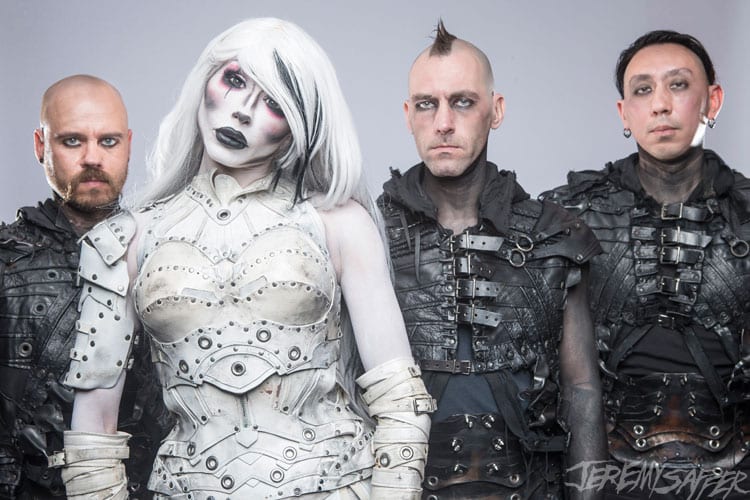
How would you explain the storyline to someone new?
Lazar: Okay, September was human, Riven came down to take her soul, he fell in love with her, gave her these super powers of being able to swap souls out and give them second chances at life, which messes with Fate, who’s the antagonist. Fate sends all these reapers after her, and she starts a big war between the living and the dead.
Juzwick: And she doesn’t remember her past. She’s learning what’s what and going, “Oh, I can do this, I can do this.”
Lazar: Yeah, everything’s a new experience for her, so it’s a weird coming of age but after you’ve come of age story (laughs). She’s tripping on it, so it’s pretty cool.
What’s next for September, and what’s next for September Mourning?
Lazar: With September Mourning, we’re just continuing the storyline. We’re looking forward to doing another story arc with Image and Top Cow. More music, more touring, and definitely bringing more life to the live show and making it really cool.




















